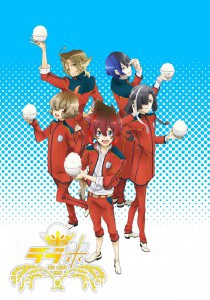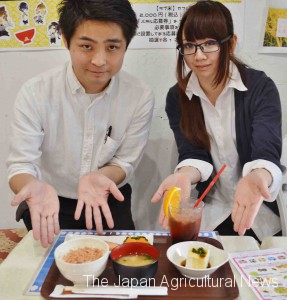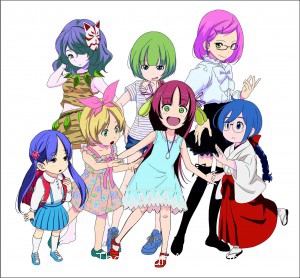Cartoon programs featuring rice-themed characters are rising in popularity. One features a group of moe-type cute female characters and another a team of good-looking male personifications of popular Japanese rice brands, for example, both in order to develop a fondness for rice among young Japanese who are increasingly moving away from rice. The Ministry of Agriculture, Forestry, and Fisheries of Japan has decided to use the anime characters on its official posters to promote Japanese food overseas, and the potential of those characters as new promotional tools are drawing attention.
In April this year, a 5-minute TV anime program, Love Kome -We Love Rice-, went on air on six local TV channels in the eastern and western regions of Japan. It’s a school comedy about a team of five good-looking male rice-themed characters, who compete with another group of male personifications of bread. Each member of the team “Love Rice” is named after the popular Japanese rice brands: Hinohikari, Sasanishiki, Hitomebore, Akitakomachi and Nikomaru. The main target of the program is the female audience in their teens or twenties. “It’s receiving a huge public response and it will be aired on additional channels starting in July,” according to the production company, Encourage Films.
A café in Ikebukuro, Tokyo, is collaborating with the program by offering a limited-time-only menu that features the characters from April 22 to May 17, 2017. At the Princess Café Ikebukuro Shinkan, you can enjoy 11 kinds of combination meals including a loco moco plate that features Hinohikari rice (JPY780).
There is an official site of the program in Japan’s largest recipe sharing service “Cookpad,” while an official net shop was opened recently to sell rice bags each featuring one of the characters and seasoned nori that goes with the rice. On May 4, there will be a rice planting event at a rice paddy named “Love Rice Farm,” which was opened in Chiba Prefecture.
“Rice was used as money in ancient times. It’s deeply ingrained in the life of Japanese. So producing an anime program featuring rice has social significance,” a 36-year-old chief producer of the program, Yoshitada Fukuhara, said. “I simply want to encourage people to eat more rice,” he said.
The Farm Ministry has decided to use the image of the five rice-themed male characters as personalities to promote the benefit of Japanese food. “It touches upon different rice brands and model numbers in its stories, providing the audience with the chance to learn more about rice,” an official said.
Another example of famous rice-based characters is a group of seven female goddesses, “Koshino Nana Komekami!” which already has an enduring and expanding popularity since its release in 2011 as sales promotional characters for rice growers in Fukuoka Prefecture.
It has become increasingly popular through articles in local papers and video footages in Youtube. A local FM radio station aired a radio drama featuring the characters, helping its expansion, and the production of the next series is now in progress. The drama introduces rice dishes from all over Japan. Makoto Kaneuji, president of the production, Daily Plan Net., said, “We’ve received an inquiry from overseas for the production of a TV anime program using these characters.”
Rice retailers in the Kyushu district can use the characters with no additional cost as promotional tools for rice grown in Kyushu. Shakemachi Beikoku-ten, a rice retailer in Fukuoka city, sells bags of rice with one of the seven goddesses on each bag. The rice bags are selling well because “young customers buy them as gifts,” the retailer said.




